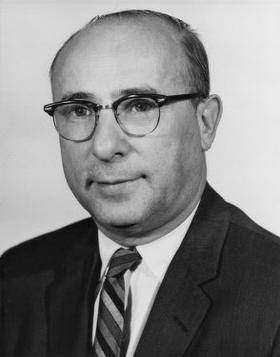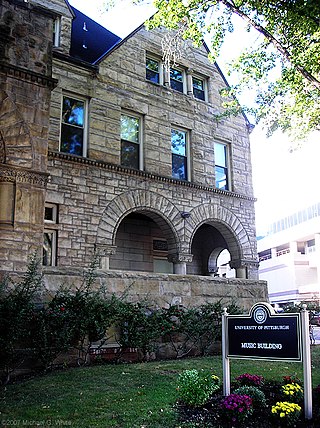
George Woods was an American college administrator. He was the fifth chancellor of the University of Pittsburgh, then called the Western University of Pennsylvania. He served in that capacity from 1858 to 1880.

George Woods was an American college administrator. He was the fifth chancellor of the University of Pittsburgh, then called the Western University of Pennsylvania. He served in that capacity from 1858 to 1880.
Although Woods is generally numbered as Pitt's fifth chancellor, he was actually the first head of the university to have the title "Chancellor" as previously heads of the university were referred to as "Principal", a holdover from the institution's academy days. Woods has been credited with creating the university's endowment, founding the science and engineering programs, and dramatically increasing enrollment.
During the early 1850s, Woods, then a resident of Yarmouth, Maine, established the Yarmouth Institute as a direct competitor to the North Yarmouth Academy. Although it attracted students from as far afield as Cuba, his institute lacked a sufficient endowment and closed after five years.
In 1859, while serving in his new role at the University of Pittsburgh, a lawsuit involving his dispute with NYA precipitated the split in Yarmouth's First Parish Church. [1]
Woods' father was an abolitionist in Yarmouth, Maine. [1]

The University of Pittsburgh is a public state-related research university in Pittsburgh, Pennsylvania, United States. The university is composed of 17 undergraduate and graduate schools and colleges at its urban Pittsburgh campus, home to the university's central administration and around 28,000 undergraduate and graduate students. The 132-acre Pittsburgh campus includes various historic buildings that are part of the Schenley Farms Historic District, most notably its 42-story Gothic revival centerpiece, the Cathedral of Learning. Pitt is a member of the Association of American Universities and is classified among "R1: Doctoral Universities – Very high research activity". It is the second-largest non-government employer in the Pittsburgh metropolitan area.

Gerald Daniel Stern was an American poet, essayist, and educator. The author of twenty collections of poetry and four books of essays, he taught literature and creative writing at Temple University, Indiana University of Pennsylvania, Raritan Valley Community College and the Iowa Writers' Workshop. From 2009 until his death, he was a distinguished poet-in-residence and faculty member of Drew University's graduate program for a Master of Fine Arts (MFA) in poetry.

Hugh Henry Brackenridge was an American writer, lawyer, judge, and justice of the Supreme Court of Pennsylvania.

Samuel Black McCormick was an attorney, Presbyterian clergyman, and educator who served as the third president of Coe College and the ninth Chancellor of the University of Pittsburgh.

Rev William Jacob Holland FRSE LLD was the eighth Chancellor of the University of Pittsburgh (1891–1901) and Director of the Carnegie Museums of Pittsburgh. He was an accomplished lepidopterist, zoologist, and paleontologist, as well as an ordained Presbyterian minister.

Wesley Wentz Posvar (1925–2001) was the fifteenth Chancellor (1967–1991) of the University of Pittsburgh.

Mark A. Nordenberg is the chancellor emeritus of the University of Pittsburgh and chair of the university's Institute of Politics. A professor of law and university administrator, Nordenberg served as the seventeenth Chancellor of the University of Pittsburgh from 1996 to 2014. Nordenberg served as the Dean of the University of Pittsburgh School of Law between 1985 and 1993 and other various administrative positions before becoming interim Chancellor of the University of Pittsburgh in 1995, a position which became permanent the following year. He became known as Nordy to many Pitt students, who voted to name a recreation center and arcade in the William Pitt Union as Nordy's Place, and is also the namesake of the university's endowed Nordenberg Scholarships and the Nordenberg Hall dormitory on the university's campus.

David Harold Kurtzman was the fourteenth chancellor (1966–1967) of the University of Pittsburgh, and the last Superintendent of Public Instruction and first Secretary of Education (1967–1971) of the Commonwealth of Pennsylvania.

Alexander Wadsworth Longfellow Jr. was an American architect and nephew of poet Henry Wadsworth Longfellow.

Reverend Doctor Robert Bruce (1778–1846) is often regarded as the first chancellor of the University of Pittsburgh, then called the Western University of Pennsylvania, serving from 1819 to 1835 and again from 1836 to 1843. During this time the heads of the university held the title of "Principal", a holdover from the institution's academy days, and there were also several Principals prior to Bruce that headed the forerunner to the Western University of Pennsylvania, the Pittsburgh Academy. In 1819 the Pennsylvania legislature modified the 1787 charter of the Pittsburgh Academy to confer university status on the school. This initiated the selection of Reverend Bruce to be Principal of the University from 1819 and he served in that capacity until 1835 when Gilbert Morgan was selected as President. Upon Morgan's departure in 1836, Bruce was reinstated to his former position.

The Music Building is an academic building of the University of Pittsburgh in Pittsburgh, Pennsylvania, United States, and a contributing property to the Schenley Farms National Historic District. A Longfellow, Alden & Harlow-designed mansion that was originally the home of the pastor of a neighboring church and former university chancellor, it also served as the home to a local chapter of the Knights of Columbus, as chemical laboratories, and as the first home of educational television station WQED and that station's original production site for Mister Rogers' Neighborhood. Today it is home to the University of Pittsburgh's Department of Music and the school's Theodore M. Finney Music Library.

Schenley Quadrangle is a cluster of University of Pittsburgh ("Pitt") residence halls that is a Pittsburgh History and Landmarks Foundation Historic Landmark and are contributing properties to the Schenley Farms National Historic District in Pittsburgh, Pennsylvania, United States.

Jeremy Mark Berg was founding director of the University of Pittsburgh's Institute for Personalized Medicine. He holds positions as Associate Senior Vice Chancellor for Science Strategy and Planning and Professor of Computational and Systems Biology at the University of Pittsburgh. From 2016 to 2019, Berg was editor in chief of the Science journals.

The University of Pittsburgh, commonly referred to as Pitt, is an independent, state-related, doctoral/research university in Pittsburgh, Pennsylvania, United States. For most of its history, Pitt was a private institution until it became part of the Commonwealth System of Higher Education in 1966.

Terrance Hayes is an American poet and educator who has published seven poetry collections. His 2010 collection, Lighthead, won the National Book Award for Poetry in 2010. In September 2014, he was one of 21 recipients of a prestigious MacArthur Fellowship, awarded to individuals who show outstanding creativity in their work.

The Log Cabin at the University of Pittsburgh, located near Forbes Avenue, in Pittsburgh, Pennsylvania adjacent to the school's Cathedral of Learning, serves as a landmark that symbolizes the university's origins on the 18th Century western frontier of the early United States. The current log cabin, estimated to date from the 1820s to 1830s, was reconstructed on the university's campus for its bicentennial celebration in order to represent Pitt's original log structure that served the institution through the school's founding in 1787 to the construction of a brick building sometime in the 1790s. The Log Cabin often appears in images and promotional material, particularly when relating to the history of the university.

Frank Addison Knight was an arborist from Yarmouth, Maine, United States. One of his most prominent roles was as the tree warden for "Herbie", an American elm that stood in Yarmouth for over 200 years. It was a role he held for around the last fifty years of the tree's life. "Herbie" was the oldest and largest American elm in New England. The tree was cut down in 2010 after succumbing to Dutch elm disease. Knight's efforts to extend the tree's life brought him international attention. He estimated he saved the tree's life on fourteen occasions over five decades. "It's his time now, and soon it will be mine," a 101-year-old Knight said, attending the tree's removal on January 19, 2010.

Brickyard Hollow is the central section of Main Street in Yarmouth, Maine, located between the Upper Village to the northwest and Lower Falls to the southeast. It is named for the brick-making business that was located across the street from the Masonic Hall at 189 Main Street, beneath the U.S. Route 1 overpass, which was built in the 1870s.